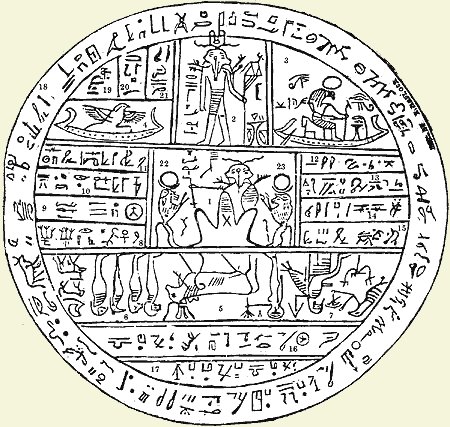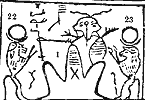A FACSIMILE FROM THE BOOK OF ABRAHAM

No. 2
|
This is a 'hypocephalus' which means 'under or beneath the head', having been
placed under the head of the dead in man's anticipation of eternity. It
depicts the 'Eye of God', which may be conceived as the 'all seeing eye' or
that 'sea of glass' through which God sees all things as though they are one
'eternal now', 'one eternal round', before his all knowing eternal
perception. Thus this facsimile is of a 'cinamascopic' or 'wide lens' view of
all of eternity, the plan of salvation, the bringing to pass the eternal life
and immortality of man, from the beginning to the end, from all eternity to
all eternity. It is the 'Big Picture', so to speak.
Since the first Pharaoh's intent and purpose was to immulate that
'priesthood', its covenant, its ordinances, its performances and its
understandings as had by Noah back to Adam from before the flood, it is quite
likely that this depiction is like having the whole of the mysteries of the
understandings of the Temple of God before one's eye or mind in one symbolic
image. Of course the truths depicted upon it are somewhat reliant upon just
how faithful the understanding of that first Pharaoh was and how well
preserved it has been over the years in the Egyptian culture.
|
|
Scriptural Text [& Editorial]
|
Commentary & Explanation
|
Footnotes ~ References ~ JST
|
 EXPLANATION
EXPLANATION
|
CARICATURE
|
COMMENTARY
|
|
Fig. 1. Kolob, signifying the first creation, nearest to the celestial, or the residence of God. First in government, the last pertaining to the measurement of time. The measurement according to celestial time, which celestial time signifies one day to a cubit. One day in Kolob is equal to a thousand years according to the measurement of this earth, which is called by the Egyptians Jah-oh-eh.
|

|
He who stands nearest or next to God the Father, even upon his right hand, is
Jehovah who is the same as Jesus Christ. Thus giving the animation of the
'star of Kolob' a living identity, Kolob is symbolic of Jesus Christ, the
central figure in God's plan of salvation. Thus the similiarity of the names
of 'Jah-ov-ah' and 'Jah-oh-eh' is of no coincidence but in fact the same
name.
|
|
Fig. 2. Stands next to Kolob, called by the Egyptians Oliblish, which is the next grand governing creation near to the celestial or the place where God resides; holding the key of power also, pertaining to other planets; as revealed from God to Abraham, as he offered sacrifice upon an altar, which he had built unto the Lord.
|

|
If the 'similiar' caricature in appearance to Kolob, which Kolob we have just
established to be sybolic of Jesus Christ, is to also be given a living
identity; that is, he who is next to Jehovah, after the Father, might well be
considered to be that third member of he Godhead, the Holy Ghost. Therefore,
could this 'Oliblish' be symbolic of the Holy Ghost?
|
|
Fig. 3. Is made to represent God, sitting upon his throne, clothed with
power and authority; with a crown of eternal light upon his head;
representing also the grand Key-words of the Holy Priesthood, as revealed to
Adam in the Garden of Eden, as also to Seth, Noah, Melchizedek, Abraham, and
all to whom the Priesthood was revealed.
|

|
In one's course in life, Christ sets the way, the path, the truth and the
light which lead's one's life to God. Adam follows after Christ in that same
course, as do we all follow the same as our father Adam after Christ, hoping
to become even as he is and eventually 'one' with the Father or of the same
nature of God, becoming as God is. The all seeing eye of Rah or God is also
depicted here as also it would seem that same symbol of 'Abraham', perhaps
indicating as Hugh Nibley has pointed out, that Abraham is in the same course
as God towards that same end as set out by him.
|
|
Fig. 4. Answers to the Hebrew word Raukeeyang, signifying expanse, or the firmament of the heavens; also a numerical figure, in Egyptian signifying one thousand; answering to the measuring of the time of Oliblish, which is equal with Kolob in its revolution and in its measuring of time.
|

|
If is quite reassuring to understand that each member of the Godhead is the
same in their manner of measurement as the other. That is to say, being
similiar and somewhat enterchangable in their various administrations in the
Plan of Salvation, the 'Light or Spirit of Christ' often serving some of the
same functions and rolls as does the 'Holy Spirit of God' or the 'Holy Ghost',
it is reassuring to understand that it mattereth not. They are but 'one' as
though they are 'One God' in their administration and ministrations unto man.
That is to say, under the expanse of heaven, Jah-oh-eh and Obilish, do hold
equal power of administration to man, both measuring the same as each other
and both being of the same status in power with God the Father, one as upon
the one hand or wing as is the other upon the other. Thus this ought be a
very reassuring symbolized caricature unto the eyes of man to look upon and
consider.
|
|
Fig. 5. Is called in Egyptian Enish-go-on-dosh; this is one of the governing planets also, and is said by the Egyptians to be the Sun, and to borrow its light from Kolob through the medium of Kae-e-vanrash, which is the grand Key, or, in other words, the governing power, which governs fifteen other fixed planets or stars, as also Floeese or the Moon, the Earth and the Sun in their annual revolutions. This planet receives its power through the medium of Kli-flos-is-es, or Hah-ko-kau-beam, the stars represented by numbers 22 and 23, receiving light from the revolutions of Kolob.
|


|
While the celestial body of the sun is not the same living body of Jehovah or
Kolob, it as all the 'suns' or stars of the heaven do, obtain and receive
their light and power in, through and of Christ. He stands as the creator of
all things both in heaven and in earth. With the 'Sun' borrowing its light
from Kolob, Jah-oh-eh or Jehovah, it is easy to see just how simple it is to
corrupt the concept of God, Jehovah, into being thought of as 'equivalent' to
being the 'Sun'. Thus many ancient societies which 'devolved' from the truth
religion of Adam and Noah, easily slipped into the worship of the sun as the
giver of life, that which radiates the power of the Son of God to the earth,
giving temporal life to all living things. It also seems quite significant
that the bullock, which is the symbol of Ephraim, or the Firstborn, is that
which is so associated with this giving of light. It is Ephraim who fulfills
the Covenant unto the taking it unto all the earth that the nations of the
Earth might be so blessed, they as it were also becoming 'saviors upon mount
Zion' in the similitude of the Savior in the course of doing so, that is in
the bring to pass the immortality and eternal life of man.
|
|
Fig. 6. Represents this earth in its four quarters.
|

|
Interestingly enough is that the scriptures often speak of the 'four beasts'
as the four quarters of the earth. The four quarters being four such
divisions whether in local, seasons or some other time related spance of
dualistic meaning.
|
|
Fig. 7. Represents God sitting upon his throne, revealing through the heavens the grand Key-words of the Priesthood; as, also, the sign of the Holy Ghost unto Abraham, in the form of a dove.
|

|
The operation of the Holy Ghost as sybolized by a dove is that very 'spirit
of revelation' upon which man is reliant in receiving all truth and light
from God, Heaven, that Celestial realm. It is fallen man's connection or
communion between God and man, Heaven and earth. Without that communicative
link, man is forever lost in darkness, having fall from the presence of God.
Thus this is the very power and means by which man may come to know,
understand and rise himself back into the presence of God.
|
|
Fig. 8. Contains writings that cannot be revealed unto the world; but is to be had in the Holy Temple of God.
|

|
|
|
Fig. 9. Ought not to be revealed at the present time.
|

|
|
|
Fig. 10. Also.
|

|
|
|
Fig. 11. Also. If the world can find out these numbers, so let it be. Amen.
|

|
|
|
Figures 12, 13, 14, 15, 16, 17, 18, 19, 20, and 21, will be given in the own due time of the Lord.
|



|
|
|
The above translation is given as far as we have any right to give at the present time.
|
|
|